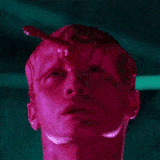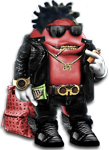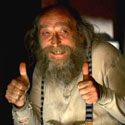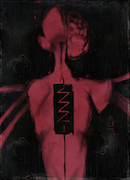|
Believe me this isn't a show that has violence for violence's sake. I love the pilot despite the rough patches being very obvious. I think that "Tony beats the poo poo out of a guy in broad daylight" scene is the only one of its type. But I would still argue it wasn't doing it to be shocking, and was meant to show you that Tony himself isn't meant to be any 'better' than the other mafia guys because he's our protagonist. But there's much more than that one scene. Look, Gandolfini is so thin! Plus it's hard for me to imagine how people wouldn't be able to see how a mob boss telling his therapist about a dream where a bird steals his penis wasn't totally out of the ordinary for late 90s TV. It's hardly the most psychologically deep concept ever but to be putting that in episode 1 of a purposed mafia story still feels like a major seismic shift to me.
|
|
|
|

|
| # ? Apr 16, 2024 08:18 |
|
I finally got around to watching the first episode last night. I think I had been putting it off because, even though my first attempt at watching it was way back in early 2010, I remembered how dated it looked even then. I also felt like I already knew everything that was going to happen and that made it harder to get motivated to watch over, say, season 2 of Hannibal which I just started last night. That being said, once I finally did buckle down and watch it, I enjoyed it more than I thought I would. I picked up on / noticed a lot more than I did the first time around (I don't think I had as much of an appreciation or tolerance for the slower dialogue-heavy scenes back then). Most of the thoughts I had while watching have already been mentioned but here are some things I saw. Yeah, it's really dated. Melfie's outfit in the first scene looked like a 90's costume. There was a moment where we got a glimpse of Meadow's computer screen and an internet browser, which was of course old as hell, but I was actually kind of surprised to see it. This was 99, right? That's pretty early for a teenage girl to have her own computer with internet capabilities, which I think speaks mostly to the Soprano's wealth. Interesting that they've already established a brother vs. son fight for control over the family, almost amusingly reminded me of Game of Thrones. Both have "legitimate claims" but the one who steps up and grabs it will be the one with all the power. Unfortunately I already have some vague idea of how things will pan out, but regardless I have I feeling I'll still enjoy Junior's scenes the most, or really any internal family power-wrestling that occurs. Again, not too many thoughts since I'm late to the discussion and have seen this one before. In the future I hope to be more punctual with my reactions and maybe even do a bit of live posting or something.
|
|
|
|
timp posted:Yeah, it's really dated. Melfie's outfit in the first scene looked like a 90's costume. There was a moment where we got a glimpse of Meadow's computer screen and an internet browser, which was of course old as hell, but I was actually kind of surprised to see it. This was 99, right? That's pretty early for a teenage girl to have her own computer with internet capabilities, which I think speaks mostly to the Soprano's wealth. It didn't air until '99 but it was actually filmed in 1997. Meadow having her own computer isn't that odd. AJ has his own too. My family had three computers in the late 90's and we weren't nearly as well off as the Sopranos. Of course because of dial-up, only one could be online at a time.
|
|
|
|
I've been both kind of Sopranos fan at different points in my life. When I first saw the show as a teenager I lusted for blood and didn't even really follow the complicated politics of the mafia characters or pay attention to Tony's therapy scenes. Its amazing to me that I could watch a show that way and get any enjoyment out of it, but I guess I was a much different person then. The show rarely shies away from violence(there is one very notable exception that I can think of but no spoilers in here), but very rarely does it use it simply to shock instead of to move the story forward. Its important to establish as early as possible that Chris is 100% invested in this life and is capable of cold blooded acts of violence, its the starting point for the journey he will take throughout the series.
|
|
|
|
Kevyn posted:It didn't air until '99 but it was actually filmed in 1997. Yeah, the majority of kids (if not all) in my class had internet when I started in highschool in 1996.
|
|
|
|
All right, time for the second episode of season 1. Anyone on the fence about continuing you'll see a noticeable increase in the overall quality of the show from this point on. It slowly increases until by the end of the season anyone who tries to say the show is "overrated" or "mediocre" is just objectively wrong. There are minor things you could complain about and nitpick, but on the whole the show is flawless. For some background, the first couple of episodes HBO was exerting a lot of pressure on David Chase for how they wanted the show to go and what their marketing/research department said would bring in the most viewers. Today, everyone knows that Sopranos set the standard for serious TV drama but at the start it was regarded as another shock-a-thon like Oz or Sex in the City. Chase eventually won out through sheer perseverance, and got free reign to craft the story he wanted without a exec leaning over his shoulder and saying "No, this won't work, viewers won't like this" and having to scrap ideas. For anyone going in fresh, the one thing I'd mention is to take a look at how Tony and co. are portrayed when doing "good things" for civilians who are friends/associates etc. Another major thing is how the rampant drug use among the up and coming young guys is exactly the kind of poo poo that gets people 25-life from either dealing or bad decision making and why the "golden age" is over and done with. I think this episode would've been a better pilot to draw people into the Soprano's, but the entire thing with Melfi and Tony's internal issues needed a ton of time for them to establish a working relationship and set the stage for what comes next.
|
|
|
|
pentyne posted:All right, time for the second episode of season 1. It's funny that the success of the Sopranos has allowed HBO to just hand people money for their shows and say "have at it" these days without any oversight.
|
|
|
|
EATIN SHRIMP posted:It's funny that the success of the Sopranos has allowed HBO to just hand people money for their shows and say "have at it" these days without any oversight. Which is also what gives us poo poo like Girls and Hello Ladies though
|
|
|
|
46 Long A great episode, in my opinion a much better introduction to The Sopranos. We start with a news story airing in the background about ex-Mobsters talking about how the golden days are gone, the code of silence (Omerta) is a joke, and how the drug trade has destroyed the "honor" of organized crime. It's cut between a scene of Tony and co. counting huge piles of cash. This is something drilled into the audience with no subtly, that even mobsters are flawed and human and they try to convince themselves and each other that their brand of criminal activity is somehow better then jumping a guy in the street for his wallet or carjacking a guy for his car (this comes into play later). Speaking of, AJ mentions to Carmela that his science teacher had his car stolen, Tony walks in, and Carm casually asks Tony to help "find the car". The implication is clearly that Tony is tied into the criminal underworld and can make a few calls to find the car, an aspect of his life that Carm ignores when its convenient but then expects to be at her beck at call when she wants it. Also, it ties into the "noble criminal" aspect where Tony can use his power to help someone associated with the family for a good cause, but no matter how noble it is someone is going to get a gun shoved in their face. I'd say the most significant part of this episode for me is how Tony treats Chris, the up and comer, and Chris' pals. Tony really hates the casual drug use (meth) of Chris's generation and for good reason. Chris and Brenden (the methhead) jack trucks on Junior's protection route, Junior gets complaints from his customers, trouble brews etc. etc. We get a great speech from a sober Chris about "Why else be in this thing? We have to play by the rules", an attitude that is constantly espoused by all members of the mob but easily ignored when its convenient for them. Most notably when Tony takes 3 racks of suits from a unauthorized hijacking and tells Chris and Brenden to take the rest back to make things right. When you're a captain/boss you can always take a chunk for yourself and place the blame on the junior members. I'm glossing over all the Tony/Livia and Tony/Melfi stuff which is fantastic and really insightful to Tony's behavior and neuroses, plus the whole subplot with Paulie and Pussy getting the car "back", so to speak. Someone with a better grasp of critical analysis can do wonders in exploring that.
|
|
|
|
My dad's a hero! 
|
|
|
|
Your uncle Pussy?
|
|
|
|
"Oh, again with the rape of the culture." This is the only episode with a pre-credits scene. The Soprano crew are sitting around counting money and bullshitting with each other about why things are hosed up, which is something I think most men can relate to. There are a few things interesting to me about this: the spark for much of the conversation is something from the media, whether the mob expert on TV or the story about the cloned sheep in the newspaper. Media creates a conversation but can't be a part of it. There's also a lot of uninformed analysis on the part of the crew, who often resort to dogma or cliche in order to justify their feelings on a matter. For instance, when the mob expert talks about the breakdown of the rules which protected the old bosses, Tony says "Hey, if the shoe fits..." Since Tony is a captain, he is able to feel like this applies to New York, maybe, or to Jackie Aprile, but as middle management doesn't see himself as part of the problem. (The rest of this episode and the next few, I think, explores whether or not he is.) We also see that Tony resorts to dogma to establish his point of view on things he doesn't understand, like the sheep cloning. There's no curiosity or desire to know about cloning sheep, just "Only God can make a life". There's also the prominent sign at the top right. Does it suggest "bull session" or "bullshit"? - The storyline with the teacher's car in this episode is poking fun at the trope that the underworld provides justice to people who wouldn't get it anywhere else. Tony hears about it because of domestic circumstances and only agrees to do it because of venal reasons - because he thinks it might help his son's grade, but also, though it's not stated, Carmela seems like the kind of woman who wouldn't let go of something once she gets it on her mind. So, Tony's acting not because this is the function that the underworld provides to society, but because he wants to avoid his wife's nagging and help out his son. It's hard to imagine a Michael Corleone type figure doing anything for these kinds of reasons. The means of providing "justice" ends up stealing another car (from someone we never hear about) to replace the stolen car. There's obviously no righting a wrong here, just doing another wrong to someone outside the bounds of Soprano-society in order to benefit someone within it. This storyline is also the first time when non-mob subcultures are presented on the show, in the form of the gay couple who stole the car. I don't know whether that's just intended as an amusing bit of characterization or whether the show is trying to say something about how the mob guys view subcultures other than their own. -  There isn't much subtlety in the action or dialogue of the coffee shop scenes, but there is an interesting piece of set design: the company logo in the window looks like the biohazard symbol. (Directly above Pussy's head in the picture.) - I often find the family stuff on this show way harder to watch than any of the mob stuff. I don't think there's very much in terms of violence or intrigue or adultery that can shock me, but the part of this episode where Tony tells Dr. Melfi that his "happy, warm" memory of his mother is the time when his father fell down the stairs at the Jersey Shore and everyone laughed at him is just heartbreaking. The way that James Gandolfini played it just seems so real and natural - how it seems like a funny, innocuous story to Tony, the first "loving, warm" story to come to mind about his mother -- but from Melfi's reaction he can tell that she thinks it's horrifying, and then he becomes defensive and angry about it and zips right back into denial. It's masterfully done. e: Something else I genuinely love about this show is how the writers and actors nail the rhythms and patterns of speech of working-class people from NY/NJ - which was also true for The Wire and people from Baltimore. As much as people say that "Albuquerque (or New Mexico) is a character in Breaking Bad", I don't think that's true to nearly the same extent. Most of the BB characters spoke like they were from Anytown USA and you could have easily set the story in any place with a combination of a city and some remote areas. But if you tried to pass Sopranos off as happening in Chicago or California or anywhere else other than NJ, it would be hilariously wrong. fantastic in plastic fucked around with this message at 22:57 on Jan 18, 2015 |
|
|
|
Tao Jones posted:"Oh, again with the rape of the culture." It's always great how defensive and angry the mob guys get about Italian culture, when they represent the absolute worst aspect of it. Plus half the time they're paying homage to a bastardized Italian-American version they were raised with and are ignorant as poo poo when it comes to actual Italian things.
|
|
|
|
pentyne posted:It's always great how defensive and angry the mob guys get about Italian culture, when they represent the absolute worst aspect of it. Plus half the time they're paying homage to a bastardized Italian-American version they were raised with and are ignorant as poo poo when it comes to actual Italian things. http://youtu.be/sRkE_Gv6ALM
|
|
|
|
I recently finished my first rewatch of the show. I think what fascinates me most about it is that it's the only (reasonably realistic, non-comedy) show I'm aware of that is almost entirely about, for lack of a more concise word, evil people. There have been a lot of shows in the last two decades focussing on criminals and villains, but never quite in this way. Breaking Bad has heroic and moral characters to some degree and is generally a more "epic" show with arguably some karmic concepts. The whole point of the Wire is that basically anyone, including the criminals, is a product of society and institutions. But the Sopranos is a show where pretty much every main character is either a willing, unreflective participant in a horrid culture or a complete psychopath. Some, like Dr. Melfi, balance it out a bit, but talking about her role in detail would be a bit too spoilery. Tony himself is definitely one of the darkest protagonists on TV, and I think one of the most fascinating aspects of the show is that it neither glorifies nor stylistically demonizes mobster culture and just shows them murdering people or ruining their lifes from a fairly neutral perspective. For me, that makes it one of the most chilling things I've ever seen, no matter how much of it is played for laughs.
|
|
|
|
Rushputin posted:I think what fascinates me most about it is that it's the only (reasonably realistic, non-comedy) show I'm aware of that is almost entirely about, for lack of a more concise word, evil people. The goal of the excellent writing and direction was always to portray these scum of earth criminals as regular guys or even noble villains. There's nothing David Chase hated more during the show's run then meeting people who talked about how sympathetic Tony Soprano was and how they related to him. His response was always something like "He's a amoral murdering thug who profits off of suffering and misery. How does that relate to you?"
|
|
|
|
Indeed. Without getting into specifics, rewatching the final season definitely gave me the impression that he really wanted to drive home that fact for the people who still somehow don't get it.
|
|
|
|
It's really hard to think of another show out there that frames humanity the same way, and I really appreciate it for that. It's just this uniquely cynical and bitter take, which bizarrely manages to utilize caricatures to capture the "feel of reality" in ways that would be lost in a more "balanced realistic" setting. While The Sopranos mainly demystifies the mob into mundane reality with this emphasis on wiping away the glamor to let the grime shine, it uses that exact same lens on every aspect of American society that pops up. The show almost has about as much contempt for the lives of the educated and elite as it does for the foolish mob characters and their constant mistakes. Everyone is the butt of the joke. And, while there is a lot of contempt, the show is caring enough about those same elements/characters that it's also driven by pathos, and underlying everything it feels like there's almost... this... thematic shrug, where beyond either impulsive acts or empty platitudes that's all there's left to do sometimes. It's incredibly difficult to accurately describe the show's attitude in few words, but I think the most succinct way is depression. Even without the characters literal experiences with depression, the show itself applies a depressed outlook on life and society, resulting in this uniquely bitter, funny, and beautiful portrayal.
|
|
|
|
Rushputin posted:Indeed. Without getting into specifics, rewatching the final season definitely gave me the impression that he really wanted to drive home that fact for the people who still somehow don't get it. There was always 1-2 episodes a season where it seemed like David Chase was giving the middle finger to middle-class Americans who thought Tony was a misunderstood hero or in any way noble. The Shield ended on a similar note Vic Mackie admitted to all his crimes to get immunity, and literally everyone was horrified at what he had done, even other semi corrupt cops who took a taste here and there EvilTobaccoExec posted:The show almost has about as much contempt for the lives of the educated and elite as it does for the foolish mob characters and their constant mistakes. Everyone is the butt of the joke. And, while there is a lot of contempt, the show is caring enough about those same elements/characters that it's also driven by pathos, and underlying everything it feels like there's almost... this... thematic shrug, where beyond either impulsive acts or empty platitudes that's all there's left to do sometimes. There's an episode where an upper-middle class man gets semi-involved with Tony and co, and ever scene featuring him just drips with contempt for him and his effete way of life. pentyne fucked around with this message at 14:33 on Jan 21, 2015 |
|
|
|
EvilTobaccoExec posted:It's really hard to think of another show out there that frames humanity the same way, and I really appreciate it for that. It's just this uniquely cynical and bitter take, which bizarrely manages to utilize caricatures to capture the "feel of reality" in ways that would be lost in a more "balanced realistic" setting. I think the world of The Sopranos is essentially Catholic - I mean, the characters are that religion, of course, but I think the world is essentially a world filled with concupiscence, this sort of longing or urge to do wicked things. Like in the pilot, beating the HMO guy -- you can tell that Tony was getting a sense of gratification from it far beyond something that's just necessary for business. Christopher killing the Czech dude, too, I think it goes beyond just a desire to prove himself or make his bones in the mob. (A later episode in Season 1 has better examples, but I do think this is a theme throughout the series.) I say it's Catholic because it doesn't seem like Soprano Universe suggests that this desire in itself is sinful, but instead it leads to sin -- and at least in my understanding of Christian theology, that's something a lot of Protestants disagree about, where they'd say the desire to sin is equal to sinning itself. That distinction lets the show get away, philosophically, with letting its characters do awful things and letting them go unpunished in the narrative. There's probably a better word and putting it in terms of religion might not be helpful, since I don't mean to suggest that Sopranos is a religious show, by any means. But I think philosophically, it's there.
|
|
|
|
pentyne posted:The Shield ended on a similar note Vic Mackie admitted to all his crimes to get immunity, and literally everyone was horrified at what he had done, even other semi corrupt cops who took a taste here and there That's still one of the most amazing scenes I think I've ever seen in television. The way the ICE Agent goes from seeming bemused at whatever "little" infractions she's about to hear, and by the end of it she's just going 
|
|
|
|
Tao Jones posted:I think the world of The Sopranos is essentially Catholic - I mean, the characters are that religion, of course, but I think the world is essentially a world filled with concupiscence, this sort of longing or urge to do wicked things. Like in the pilot, beating the HMO guy -- you can tell that Tony was getting a sense of gratification from it far beyond something that's just necessary for business. Christopher killing the Czech dude, too, I think it goes beyond just a desire to prove himself or make his bones in the mob. (A later episode in Season 1 has better examples, but I do think this is a theme throughout the series.) There's are a lot of great scenes with Carmella and the priest. She's really the only character he ever interacts with in a significant level. The idea of religion, justice, retribution, karma, etc. is a major part of the show. It's less blatant then some of the other symbolism things but definitely comes into play, especially with how some of the mobsters view their life and actions in regards to their fate. Jerusalem posted:That's still one of the most amazing scenes I think I've ever seen in television. The way the ICE Agent goes from seeming bemused at whatever "little" infractions she's about to hear, and by the end of it she's just going At the time The Shield was drawing a lot of Sopranos comparisons and the writing staff really wanted to stand out as their own show and absolutely nailed it.
|
|
|
|
Denial, Anger, Acceptance More detail after the "airing", but this episode has the most significant scene (in my opinion) in the entire series in defining Tony and Artie's relationship as genuine friends and the only person he can drop the "mob guy" attitude around.
|
|
|
|
pentyne posted:For some background, the first couple of episodes HBO was exerting a lot of pressure on David Chase for how they wanted the show to go and what their marketing/research department said would bring in the most viewers. Today, everyone knows that Sopranos set the standard for serious TV drama but at the start it was regarded as another shock-a-thon like Oz or Sex in the City. Chase eventually won out through sheer perseverance, and got free reign to craft the story he wanted without a exec leaning over his shoulder and saying "No, this won't work, viewers won't like this" and having to scrap ideas. I'm at the tail end of season 6 right now. This will be my fourth full rewatch of the show. I don't feel like restarting since it's so fresh in my mind, so I can't participate in this thread. But I did just want to comment really quickly on what you said and encourage others who are on the fence to continue. I vividly remember the commercial on HBO before the show aired, which you can see here: https://www.youtube.com/watch?v=nZ7u9U-fdQI The vibe it gives is just so atrocious and doesn't reflect what the show is about at all. I watch that commercial and it seems like the show is gonna be some dumb gimmicky comedy. Watching the early episodes it's so hard for me to see it through new eyes, so I can't say they are slow or bad. It's all too fluid for me. I cannot see the show as anything other than a 4,300 minute story. But I will say that when I saw that commercial in 1998, I thought the show looked really hokey and dumb, and didn't start watching until whenever the first VHS Boxset was released because by that point it had so much acclaim and I realized it was probably better than the commercial. So I guess basically if you are on the fence, stick with it. It is truly the best show ever made.
|
|
|
|
pentyne posted:Denial, Anger, Acceptance So, the episode. I'm not one for in depth analysis of the episode, but there were a few major things to take away from the episode. 1) Tony gets real, like emotional real with Melfi when discussing Jackie's cancer. At the start, he walks in thinking he's cracked the code of therapy, commenting on the painting and trying to prove he's above it. By the end, he lets raw emotion out to her because a man he sees as an invincible titan is being eaten away by an unbeatable force that no strength of arms can stop. This is another real out-pour from him to her, progress on the therapy front, but there's no promise that it'll lead to anything meaningful. 2) Tony and Artie. Artie's wife has an extremely important role in absolutely refusing to let Artie take a little "start-up cash" from Tony. Even though as we see from the Tony/Artie food fight that Tony genuinely loves Artie and would almost certainly give him the cash with no strings attached besides "pay me back when the insurance comes" and you can see Tony's face when the word arson is mentioned, he regrets it but can't admit it to himself or anyone else. Likewise Artie keeps trying to convince his wife that it's okay to accept a "gift" from Tony Soprano, but she will never accept it because she knows where the money comes from, pain, suffering, and death. 3) Meadow. She knows what Tony does. It's not a secret at all, and Chris doesn't even bother to try and hide it, rather flat out telling her Tony would kill him for giving her drugs. He ends up giving her "safe meth" so she won't head down to the pier and possibly get some poison poo poo. Still a really bad idea. But then Chris up to this point has been nothing but bad ideas and bad friends, so its par. 4) Junior: Things have escalated fast, because one party has decided that they've been disrespected, and respect is the currency of the mob. When they start killing each other and dropping bodies in the street, its less about money and more about respect and power. 5) The Jews: We finally see brutality and ugliness straight from the hand of Tony himself. The head guy makes a deal with Tony and attempts to renege and pay him off, and gets a rough introduction into reality of getting into bed with the mob. You make Tony a promise for something you either deliver or risk a beating and possibly death. Plus, we get an introduction to something that baffles Tony like no other, a man with principles who refuses to give them up. Tony Soprano is a man who expects the world to bend and sway to his desires, and when up against a solid rock he has literally no idea what to do besides murder. As far as the show goes, things are picking up, and we're two episodes away from one of the highest regarded episodes of the entire series in "College" and what secured the Sopranos legacy. Please, anyone who's watching/watched this show pop in to comment because the run from "College" to "I Dream" is probably the clincher for securing the Sopranos audience and establishing the show as something that in 1999 was so far ahead of the curve that people literally couldn't believe it.
|
|
|
|
pentyne posted:The violence committed by Tony and co. is usually framed in the context of the show as noble and measured when any sane person would view it as horrific and brutal. Real life mob guys have given interviews and mentioned how the slapdash way that organized crime is portrayed in the show would get them all caught within months. This is actually the main thing I've taken away from it so far. There doesn't seem any separation between the troops and the leadership in action, which seems like a prime recipe for everyone getting picked up by the police. You'd think they'd be much more careful about the way that they commit these crimes.
|
|
|
|
PrincessKate posted:So I guess basically if you are on the fence, stick with it. It is truly the best show ever made. Beyond that, it's considered the "Great American Novel" of our time. The Wire might be the greatest show ever, but it still ranks below the Sopranos in terms of sheer complexity, enjoyment, and plain fun. In 50 years, The Sopranos could be taught/studied alongside other great works of the English language in academia and especially as a watershed moment for what a TV show could be. Think of the classic, highly regarded American shows from the 1950s-90s. Almost all of them were sitcoms (another genre reinvented in the last decade) and if you wanted serious drama your best chance was catching some British/Euro imports on PBS. In just the last 10 years we've seen serialized dramas that are unquestionably some of the best TV ever. Sopranos, The Shield, The Wire, Mad Men, Breaking Bad, Homeland (season 1 only), Friday Night Lights (personal preference, still great) and if you look back at the Emmy's pre-2000s you'll see a list of shows that are good, but nowhere close to anything like the last few years. TV dramas in the 80s and 90s were things like Miami Vice, Northern Exposure, X-Files, Chicago Hope, ER, NYPD Blue. Good shows, but left in the dust and now just good examples of how they made TV back then. The only exception I can think of is Homicide: Life on the Street which basically The Wire of its day. CottonWolf posted:This is actually the main thing I've taken away from it so far. There doesn't seem any separation between the troops and the leadership in action, which seems like a prime recipe for everyone getting picked up by the police. You'd think they'd be much more careful about the way that they commit these crimes. Obviously during the run of the show people were falling over themselves to talk to actual mobsters what they thought of the show, and the consensus was that they enjoyed the show, but the way criminal behavior and activity was portrayed was a terrible way to run a mob and all the guys doing that poo poo would've been caught in a matter of months. The FBI is also way less competent in the show then in real life. pentyne fucked around with this message at 18:05 on Jan 25, 2015 |
|
|
|
Anyone still watching? I'm watching Season 1 Episode 7 right now. The one where Tony's mom finds out about him going to the psychiatrist. Lots of great flashbacks to Tony's childhood and his mom being just about the biggest bitch in tv history. Just wanna smother her with a pillow. Really good episode
|
|
|
|
EATIN SHRIMP posted:Anyone still watching? I'm watching Season 1 Episode 7 right now. The one where Tony's mom finds out about him going to the psychiatrist. Lots of great flashbacks to Tony's childhood and his mom being just about the biggest bitch in tv history. Just wanna smother her with a pillow. Really good episode I stopped because there was no one else posting about it. I'll probably come back for the last 2 episodes to talk about them.
|
|
|
|
Good show
|
|
|
|

|
| # ? Apr 16, 2024 08:18 |
|
Tao Jones posted:e: Something else I genuinely love about this show is how the writers and actors nail the rhythms and patterns of speech of working-class people from NY/NJ - which was also true for The Wire and people from Baltimore. As much as people say that "Albuquerque (or New Mexico) is a character in Breaking Bad", I don't think that's true to nearly the same extent. Most of the BB characters spoke like they were from Anytown USA and you could have easily set the story in any place with a combination of a city and some remote areas. But if you tried to pass Sopranos off as happening in Chicago or California or anywhere else other than NJ, it would be hilariously wrong. In Breaking Bad it was more visual, the vistas, the buildings, just the general background to almost every scene. Alberqueque was a silent character, and the visual presence was enough because the camera work blew out every preceding show out of the water. In Sopranos and the Wire, you get it more from the characters themselves, and I prefer that, because I like seeing what life is in the other parts of the world.
|
|
|
























